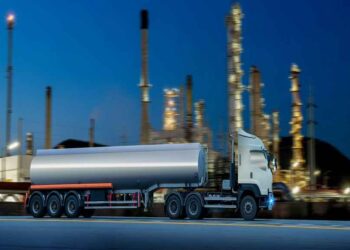Mexico, Canada, and the US will need to significantly increase investments in energy systems if they expect to achieve the full benefits of a North American energy renaissance, New Jersey Gov. Chris Christie (R) said during a multiday visit to Mexico.
“Here in Mexico, I know the government has pledged to do this in its 5-year plan—encompassing not only energy, but roads, railways, and telecommunications as well,†he said in a Sept. 3 address to American Chamber of Commerce of Mexico. “Under the plan, the energy sector alone is targeted for a quarter-trillion dollars of new infrastructure investment.â€
But Christie, whom many consider a possible candidate for the 2016 Republican presidential nomination, added that system investment needs, particularly for oil and gas pipelines, also exist in Canada and the US.
Delays in federal cross-border permit approval of TransCanada Corp.’s proposed Keystone XL crude oil pipeline send multiple negative signals, Christie warned. “First, it reduces the willingness of investors to make other large investments in large-scale, capital-intensive projects that are needed to help our energy reach its customers,†he said, adding, “So it has a chilling effect on economic growth and job creation even beyond this one very important project.â€
He said the delays also limit Canadian producers’ ability to get increased production from Alberta’s oil sands to markets, “not only hurting production and growth, but creating a major strain in relations with another key American ally—the government of Canada.
“Approving Keystone would actually drive down the price of oil and help consumers in all North American countries. It should be done today,†the governor declared.
More reliance on rail
Lack of adequate US pipelines and capacity also means much of the country’s increased crude production has to be shipped by rail, he said. “Now, that can be a good thing, as rail affords more flexibility in response to market needs. But the lack of pipeline infrastructure can also have the effect of increasing costs, thereby potentially limiting the benefits of the energy revolution.â€
A forward-looking US energy infrastructure policy also would prioritize approval of pipelines exporting gas to Mexico, he said. “There is a strong likelihood in the wake of Mexico’s reforms of increased Mexican demand for US gas,†Christie told his Mexico City audience. “Fast-tracking this infrastructure can grow the US gas trade with Mexico, to the benefit of both countries. A recent report by the Atlantic Council makes this point clearly.â€
He said the steps have to be part of a policy to increase transparency and reduce regulatory uncertainty in the US energy project approval process.
“Major investments, not only in pipelines, but in value-added facilities like chemical plants are being delayed, despite favorable economics, because they require a significant long-term investment that is simply being delayed by permitting, sitting, and other forms of regulatory uncertainty,†the governor said. “This lack of regulatory predictability is hurting the manufacturing sector and job creation in the US.â€
Reasonable and predictable regulations also will be essential as Mexico implements the sweeping oil and gas reforms it adopted this year, Christie said.
“One key determinant of the success of Mexico’s reforms in attracting foreign investment will be the speed, transparency, and clarity with which the new regulations in energy are adopted and implemented,†he said. “Another will be the competitiveness embodied in contract terms and in tax and royalty rates, which have to be tailored to attract the needed investment.â€
More US crude, LNG exports
A second positive US energy policy step would be to authorize more exports of crude and LNG, he said. “The 1970s-era ban on crude exports creates a price anomaly which holds US oil at a discounted price, which ultimately hurts upstream production and limits the energy boom,†Christie said.
In the case of gas, prices in Europe and Asia are materially higher than in the US, with several companies applying for licenses and raising money to build export facilities, he said.
European countries’ responses to Russian incursions in Ukraine reveal other potential long-term benefits to the US allowing more domestically produced energy to reach global markets, the governor said. “In the short and even medium term, Europe will remain heavily dependent on imported Russian gas and energy. But in the long term, the strategic value of reducing this dependence is clearer than ever.â€
It’s also essential not to limit North American energy resource development with what Christie called “foolish regulation.†He said the Obama administration is on an extreme regulatory path which would depart from working toward orderly transition to a less carbon-intensive future, and instead pursue a radical change in the US energy mix which would reduce electricity reliability.
“This is ironic as the technology revolution and the continued advance of cloud computing increases the need for electric power from data centers across the country,†Christie said. “A mix shift away from coal and toward gas is already under way due not only to regulation of new plant construction but more importantly to prices as the shale revolution makes gas-fired plants a cheaper alternative. This is also contributing mightily to a reduction in US greenhouse gas emissions.â€
Continued technology investments and advances will be important, he indicated. “Just as new technologies have made the dramatic advances in shale oil and gas production possible and helped launch a new era of energy strength and security for North America, investing in technology can also help us do everything from driving down the cost of renewable energy sources to advancing new techniques for burning coal more cleanly and storing and sequestering carbon,†he said.
Industry’s responsibilities
The US oil and gas industry also must do its part, Christie emphasized. In exploration and production, it must ensure that chemicals used in hydraulic fracturing are properly handled, minimize surface disturbance, ensure well integrity, and dispose and recycle water intelligently and safely, he said. It also should continue to measure and ultimately capture methane emissions in a cost-effective way, he added.
“What we need are regulatory policies that will harness the benefits and manage the risks of all fuels that are in abundant supply in our country,†Christie said. “This is the way to create a true ‘all of the above’ energy strategy, not one which selectively doles out punishment for certain fuels based on political considerations.â€
Finally, he said, it’s essential to recognize—particularly with Mexico’s newly adopted reforms—that the North American energy market already is integrated, and likely to become more so over time.
“So we must recommit to the integration process and work to adopt new policies that will harmonize regulations, improve the efficiency of supply chains, and work toward a more smoothly functioning and ultimately cost-effective energy supply network across borders on this continent,†Christie said.
“This is the path to increased competitiveness, enhanced economic growth, and greater job creation in all three countries—Canada, Mexico, and the US,†he said.

















































